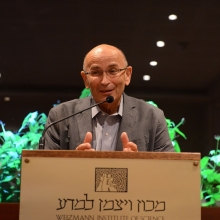Mixing light and matter
Dr. Alexander Poddubny explores quantum optics and the powerful interactions between atoms and photons
New scientists

Dr. Alexander Poddubny
Dr. Alexander Poddubny, a new principal investigator in the Department of Physics of Complex Systems, studies quantum optics, with a focus on the theory of systems that contain both atoms and photons—tiny packets of electromagnetic energy. In certain types of interactions, he explains, atoms don’t “talk” to each other directly, but rather interact by exchanging photons at relatively “large” distances from each other—in the microns (1 millionth of a meter) or tens of microns.
The interaction of clouds of cold atoms with photons enables the formation of Rydberg polaritons—hybrid half-light half-matter excitations, or atoms mixed with photons. Polaritons can also be made with artificial atoms, such as superconducting qubits, the basic unit of quantum information. When asked if his work could contribute to the growing field of quantum computing, Dr. Poddubny explains that his work is closer to “quantum simulation,” which he describes as a “new playground,” than to work on quantum computers. Ultimately, insights in his field could lead to the discovery of previously unknown states of quantum matter.
Particle interactions
In the last few years, Dr. Poddubny has mainly studied how two of these particles interact with each other. At the Weizmann Institute, he plans to study interactions between more particles—technically known as many-body quantum optics. After completing his BSc and MSc in physics at St. Petersburg State Technical University in Russia, Dr. Poddubny went on to earn a PhD in semiconductor physics under the supervision of Prof. E.L. Ivchenko at the Ioffe Institute of the Russian Academy of Sciences in St. Petersburg. From 2016-2022, he worked as a senior scientist at the Ioffe Institute. In 2022, he was promoted to chief scientist. From 2018-2021 he was also a Future Fellow at the Australian National University in Canberra, traveling back and forth until the COVID pandemic forced him to finish his fellowship remotely.
The road from Russia
In the spring of 2022, shortly after the start of the Russia-Ukraine war, Dr. Poddubny and his wife decided to leave Russia with their then one-month-old daughter, even though they were physically safe in St. Petersburg. They arrived in Israel as refugees and obtained citizenship (to which he was entitled through his grandfather). While Dr. Poddubny never imagined himself working at the Weizmann Institute, he was familiar with some of the Institute’s quantum research, and so he applied for and was accepted to the Weizmann Institute’s emergency aid program for Ukrainian and Russian academics. In 2022 he began as a Visiting Scientist, and in 2023 became a Principal Investigator. The unexpected arrival in Israel and at the Weizmann Institute turned out to be serendipitous. “Somehow, it turned out that the things I’m interested in and the things being done in the department I joined are very well aligned,” he says, explaining that at the Ioffe Institute, there were no big experimental groups working in his field, or groups working with ultra-cold atoms or superconducting qubits. At Weizmann, there are groups studying all these subjects and more. He is already collaborating with several physicists on campus—he contributed to a theoretical paper by his departmental colleague Prof. Ofer Firstenberg and co-wrote another paper on the theory of quantum optics with Dr. Serge Rosenblum of the Department of Condensed Matter Physics.
Next comes Hebrew
A year and a half after arriving in Israel, Dr. Poddubny and his family are settling in. They live in the Marcus Residences adjacent to campus. He likes Rehovot, and prior to the outbreak of war in October 2023, the family enjoyed visiting as much of the country as they could with a toddler in tow. He has a special love for the North, where the fir trees remind him of his homeland. Already fluent in English, German, and Italian, he is now studying Hebrew. “I had an idea that it would be my next language, and so it turned out to be,” Dr. Poddubny says, noting that his wife—a Russian-English interpreter by profession—is already fairly fluent in Hebrew herself. “At Weizmann, everyone tries to help you,” he says. “There are so many options, so many people, so many possibilities.”
Education and select awards
• BSc (2006) and MSc cum laude (2008), St. Petersburg State Technical University
• PhD, Ioffe Institute of the Russian Academy of Sciences, St. Petersburg (2010)
• Dynasty Fellowship for young researchers (2006, 2009, 2014); Ioffe Institute Award for Best Scientific Work (2012, 2014, 2017, 2021); Leonhard Euler Prize for Young Scientists from the Municipality of St. Petersburg (2018); Letokhov Medal for Young Scientists from the Rozhdestvensky Optical Society (2020); Sir Charles Clore Prize for Outstanding Appointment as Senior Scientist (2023)
Appointments
Future Fellow (2018-2021), Australian NationalUniversity, Canberra
Senior Scientist (2016-2022), Chief Scientist(2022), Ioffe Institute of the Russian Academy of Sciences, St. Petersburg








